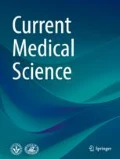Summary
This study examined the changes of activities of vitamin K-dependent clotting factors (VKDCF) under various pathological conditions and explored the relationship between acquired deficiency of VKDCFs and hemorrhage. Clinical data of 35 patients who were diagnosed as having acquired deficiency of VKDCF were retrospectively analyzed. Coagulation factors involved in the intrinsic and extrinsic pathways were detected in these patients and 41 control subjects. The results showed that the average activities of VKDCFs were decreased in the patients in comparison to the control subjects and significantly increased after treatment of these patients with vitamin K and blood products. Multivariate regression analysis indicated that decreased activity of VKDCF was not an independent risk factor for bleeding disorders owing to deficiency or metabolic disturbance of vitamin K. It was concluded that acquired deficiency of VKDCF occurs under a variety of pathologic conditions and is closely associated with hemorrhagic events. Administration of vitamin K and transfusion of blood products containing high concentrations of VKDCFs helps alleviate the hemorrhagic diseases.
Similar content being viewed by others
References
Cranenburg EC, Schurgers LJ, Vermeer C. Vitamin K: the coagulation vitamin that became omnipotent. Thromb Haemost, 2007,98(1):120–125
Harrington DJ, Western H, Seton-Jones C, et al. A study of the prevalence of vitamin K deficiency in patients with cancer referred to a hospital palliative care team and its association with abnormal haemostasis. J Clin Pathol, 2008,61(4):537–540
Shearer MJ. Vitamin K metabolism and nutriture. Blood Rev, 1992,6(2):92–104
Oldenburg J, Watzka M, Rost S, et al. VKORC1: Molecular target of coumarins. J Thromb Haemost, 2007,5(Suppl 1):1–6
Wallin R, Wajih N, Hutson SM. VKORC1: a warfarin-sensitive enzyme in vitamin K metabolism and biosynthesis of vitamin K-dependent blood coagulation factors. Vitam Horm, 2008,78:227–246
Blanchard RA, Furie BC, Jorgensen M, et al. Acquired vitamin K-dependent carboxylation deficiency in liver disease. N Engl J Med, 1981,305(5):242–248
Furie B, Furie BC. Mechanisms of Thrombus Formation. N Engl J Med, 2008,359(9):938–949
Dam H, Schonheyder F. A deficiency disease in chicks resembling scurvy. Biochem J, 1934,28(4):1355–1359
Furie B, Furie BC. Molecular and cellular biology of blood coagulation. N Engl J Med, 1992,326(12):800–806
Rapaport SI. Coagulation problems in liver disease. Blood Coagul Fibrinolysis, 2000,11(Suppl 1):S69–74
Lisman T, Leebeek FW, de Groot PG. Haemostatic abnormalities in patients with liver disease. J Hepatol, 2002,37(2):280–287
Amiral J, Fareed J. Thromboembolic diseases: biochemical mechanisms and new possibilities of biological diagnosis. Semin Thromb Hemost, 1996,22(Suppl 1):41–48
Penning-van Beest FJ, Gómez García EB, van der Meer FJ, et al. Levels of vitamin K-dependent procoagulant and anticoagulant proteins in over-anticoagulated patients. Blood Coagul Fibrinolysis, 2002,13(8):733–739
Senzolo M, Burra P, Cholongitas E, et al. New insights into the coagulopathy of liver disease and liver transplantation. World J Gastroenterol, 2006,12(48):7725–7736
Wiedermann CJ, Stockner I. Warfarin-induced bleeding complications -clinical presentation and therapeutic options. Thromb Res, 2008,122(Suppl 2):S13–18
van Hasselt PM, de Koning TJ, Kvist N, et al. Netherlands Study Group for Biliary Atresia Registry. Prevention of vitamin K deficiency bleeding in breastfed infants: lessons from the Dutch and Danish biliary atresia registries. Pediatrics, 2008,121(4):e857–863
Papadopoulos V, Filippou D, Manolis E, et al. Haemostasis impairment in patients with obstructive jaundice. J Gastrointestin Liver Dis, 2007,16(2):177–186
Pereira SP, Rowbotham D, Fitt S, et al. Pharmacokinetics and efficacy of oral versus intravenous mixed-micellar phylloquinone (vitamin K1) in severe acute liver disease. J Hepatol, 2005,42(3):365–370
Kerr R, Newsome P, Germain L, et al. Effects of acute liver injury on blood coagulation. J Thromb Haemost, 2003,1(4):754–759
Wong RS, Cheng G, Chan NP, et al. Use of cefoperazone still needs a caution for bleeding from induced vitamin K deficiency. Am J Hematol, 2006,81(1):76
Rashid M, Durie P, Andrew M, et al. Prevalence of vitamin K deficiency in cystic fibrosis. Am J Clin Nutr, 1999,70(3):378–382
Chen CS, Cumbler EU, Triebling AT. Coagulopathy due to celiac disease presenting as intramuscular hemorrhage. J Gen Intern Med, 2007,22(11):1608–1612
Sundaram A, Koutkia P, Apovian CM. Nutritional management of short bowel syndrome in adults. J Clin Gastroenterol, 2002,34(3):207–220
Prentice CR. Acquired coagulation disorders. Clin Haematol, 1985,14(2):413–442
Kuzu MA, Kale IT, Cöl C, et al. Obstructive jaundice promotes bacterial translocation in humans. Hepatogastroenterology, 1999,46(28):2159–2164
Bruno GR, Howland MA, McMeeking A, et al. Long-acting anticoagulant overdose: brodifacoum kinetics and optimal vitamin K dosing. Ann Emerg Med, 2000,36(3):262–267
Spahr JE, Maul JS, Rodgers GM. Superwarfarin poisoning: a report of two cases and review of the literature. Am J Hematol, 2007,82(7):656–660
Girolami A, Scandellari R, Scapin M, et al. Congenital bleeding disorders of the vitamin K-dependent clotting factors. Vitam Horm, 2008,78:281–374
Ben-Tal O, Zwang E, Eichel R, et al. Vitamin K-dependent coagulation factors and fibrinogen levels in FFP remain stable upon repeated freezing and thawing. Transfusion, 2003,43(7):873–877
Leissinger CA, Blatt PM, Hoots WK, et al. Role of prothrombin complex concentrates in reversing warfarin anticoagulation: a review of the literature. Am J Hematol, 2008,83(2):137–143
Hoffman CJ, Lawson WE, Miller RH, et al. Correlation of vitamin K-dependent clotting factors with cholesterol and triglycerides in healthy young adults. Arterioscler Thromb, 1994,14(11):1737–1740
Kamali F, Edwards C, Wood P, et al. Temporal variations in plasma vitamin K and lipid concentrations and clotting factor activity in humans. Am J Hematol, 2001,68(3): 159–163
Author information
Authors and Affiliations
Corresponding author
Additional information
These authors contributed equally to this work.
This project was supported by grants from the Ministry of Health of China (No.[2007]353), the National Natural Sciences Foundation of China (N0. 30700332), the National Outstanding Youth Foundation (No.30825018), and the National Basic Research Program (973 Program, No.2007CB935803).
Rights and permissions
About this article
Cite this article
Yang, R., Zhang, X., Wei, W. et al. Relationship between acquired deficiency of vitamin K-dependent clotting factors and hemorrhage. J. Huazhong Univ. Sci. Technol. [Med. Sci.] 30, 312–317 (2010). https://doi.org/10.1007/s11596-010-0348-1
Received:
Published:
Issue Date:
DOI: https://doi.org/10.1007/s11596-010-0348-1



